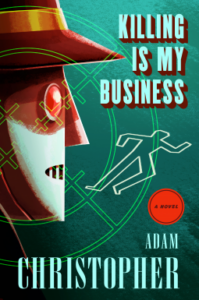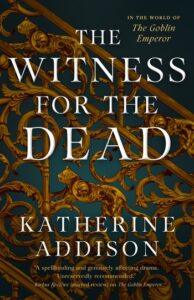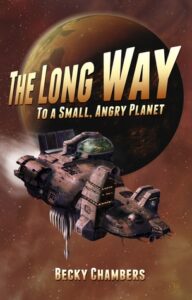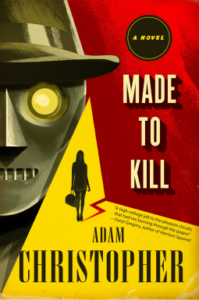Posted October 2, 2021 by Nicky in Reviews / 0 Comments
 Magic Binds, Ilona Andrews
Magic Binds, Ilona Andrews
Magic Binds would be an impossible read without all the previous books building up the story, laying the groundwork for the relationships, and painting the world Kate works in. When you think about the progression from Magic Bites to this, it’s pretty staggering — the whole scope has changed, the stakes are huge, and there are so many characters of all kinds to love and hate.
I think one of the best things about this book is the nuance it brings to the relationship between Kate and her family. From her heritage being almost completely hidden in the first book to the reveal of what she’s been raised to do to her claim on Atlanta to this… I won’t say too much, but there’s a surprisingly moving scene with someone who you don’t expect to have a quiet moment with. Actually, a couple of moving scenes with very unexpected people, honestly. And some very interesting developments with Christopher…
The ending feels a little cut off at the knees; the book accelerates toward the ending and then, of course, stops. And the next book doesn’t pick straight up from there or something — it’s quite the anticlimax. It feels like there was too much ending to do in one book, so then it just kind of abandons ship.
It gets harder with each book to do reviews without spoilers, and this is not a book where anyone could jump in, pick it up alone, and understand what’s going on. I highly recommend the series, but don’t start here!
Rating: 4/5
Tags: book reviews, books, Ilona Andrews, mystery, romance, SF/F
Posted September 28, 2021 by Nicky in Reviews / 0 Comments
 Magic Shifts, Ilona Andrews
Magic Shifts, Ilona Andrews
Magic Shifts is the last book of this series that I’ve read before, and it’s very difficult to review without spoilers for people who haven’t read the previous books. There’s a “monster of the week”, of course, in that Eduardo gets kidnapped, so Kate and Curran have to dig into what happened there, figure out who/what is spawning weird giants that metamorphose into other animals, and find Eduardo. There’s also some background information about djinn and their place in the world, and about ghouls (only briefly mentioned before, if at all).
There’s also a lot of development for the changes to the Pack composition begun at the end of the last book, and a lot of personal changes for Kate and Curran. Like, you know, having to get used to living in suburbia with a nosey neighbour who wants Curran to avoid walking around in his lion form.
And then there’s the fallout of the previous book, and some hints about where things are going… And that’s all I’ll say about that.
Like the previous books, there’s a lot of action, the plot moves quickly, and Kate is a bit better at investigating things than she says she is. Some things fall into place beautifully, and there are some really nice character moments.
Rating: 4/5
Tags: book reviews, books, Ilona Andrews, mystery, romance, SF/F
Posted September 25, 2021 by Nicky in Reviews / 0 Comments
 Killing Is My Business, Adam Christopher
Killing Is My Business, Adam Christopher
Killing is My Business is very much in the same vein as the first book: Raymond Electromatic is one of the world’s last robots, originally designed as a private investigator, and co-opted by his partner Ada to become a hitman. He has a little limitation: he can only remember the past 24 hours, along with the background information that’s hard-coded and gives him his skills.
The feel is very Chandler-esque, and the story slips by quickly. The one frustrating thing for some people might be the fact that some things are obvious to the reader before they’re obvious to the narrator, due to the gaps in his memory. Personally, I thought that was well-handled, but if all you care about is getting to the answer then you might feel like shrieking a bit.
I’ve never read the third book, and I’m looking forward to it now; the ending of this book does some really nice setup for the truth to come out.
Rating: 4/5
Tags: Adam Christopher, book reviews, books, crime, mystery, SF/F
Posted September 22, 2021 by Nicky in Reviews / 0 Comments
 Magic Breaks, Ilona Andrews
Magic Breaks, Ilona Andrews
There is a particular scene from this book that I remembered without remembering much else, and it really seared its way into my brain — the rest of the book, even though it was a reread, was pretty unfamiliar… which meant I had a few shocks! Really, the whole thing was kinda stressful, right from the moment I read the author’s note talking about how this feels like the end of the series in some ways. And it really does — you’d walk away with questions, still, but that’s not necessarily a bad thing, and it certainly turns a page for Kate and her family.
It’s difficult to review this without saying too much, to be honest. There are a few ways that this book is a gamechanger for Kate, and it’s probably most fun if you experience it for yourself.
Personally, I continue to love that these books aren’t straightforward to define: it’s not just a story of vengeance, or a story of a mouthy mercenary with some flashy magic, or a romance story, or a set of stories about a private investigator, or a story of post-apocalyptic survival. There’s so much going on.
To get a little more specific about this book, I love that we get to see more of Ghastek, his past and what drives him. It’s also interesting to see more of some members of the pack, particularly Robert Lonesco. I could wish for more of Andrea and Raphael in this book, but it’s also fun to change it up.
Rating: 4/5
Tags: book reviews, books, Ilona Andrews, romance, SF/F
Posted September 21, 2021 by Nicky in Reviews / 0 Comments
 Elatsoe, Darcie Little Badger
Elatsoe, Darcie Little Badger
Elatsoe is a book set in a slightly alternate US, with many things that are familiar… and some things that aren’t, like Ring Travel (for those related enough to fairies to use fairy rings as transport) and the well-known presence of things like ghosts, vampires, and weird cursed scarecrows. Darcie Little Badger is Lipan Apache, and so is her main character and her family, and the story is strongly informed by those traditions, stories and magic.
I think that for the right person, this book is pure magic. There’s a lot to enjoy, like Kirby the ghost dog, and the ghost trilobites, and for goodness’ sake the ghost mammoth. The world-building around the story is pretty fascinating, in its differences and the way it makes different traditions work together. I also enjoyed the trust between Ellie and her parents, and the fact that they believe her and act on what she tells them (unlike many parents in YA books). It’s also cool that Ellie is casually revealed to be asexual.
I didn’t fall head over heels for it, though. It felt like it just wasn’t aimed at me, really; there was nothing that I hated or could point to that I didn’t specifically like, though the narration felt a little young, and I could never quite place how old Ellie was meant to be. (We’re told at one point, or at least get a pretty good idea, from her thoughts about college and so on, but then I kept reading her as younger.)
So, not quite for me — and yet still enjoyable: I read it in big chunks, after all!
Rating: 3/5
Tags: book reviews, books, Darcie Little Badger, queer fic, SF/F
Posted September 20, 2021 by Nicky in Reviews / 2 Comments
 The Witness for the Dead, Katherine Addison
The Witness for the Dead, Katherine Addison
I don’t love this book as much as I love The Goblin Emperor, but that would be very difficult, and there is a lot to love about this book all the same. It follows Thara Celehar, and has very little to do with the first book, except in expanding what Celehar does and showing us his witnessing first hand. It also expands the world far beyond the court, so that we get to see how ordinary people live and interact — a thing which Maia will never, ever see, and which I think he would find fascinating.
The book is a murder mystery, essentially — actually, several — and also features more directly obvious magic than in the first book. There are ghouls and ghosts, and Celehar’s ability to commune with the dead is also a much bigger part. Inevitably, the various stories come together to some degree, but it doesn’t come together in too neat a knot; they aren’t all related. (For fellow mystery fans, I have to say that I don’t think you can actually work this one out for yourself; we don’t have enough information about a particular character to be able to discern their motive, means or opportunity.)
Celehar is just as tortured a character as he seemed from the previous book, and it should be noted that (in this book at least) there’s comparatively little comfort for him. There is a short scene where another character does manage to lighten the burden of his conscience, and he also makes a friend… though the friendship — and the potential that it could be more — also frightens him, because he isn’t over the secret he confesses to Maia in The Goblin Emperor. If you’re looking for something that feels as hopeful as The Goblin Emperor, then this isn’t it; Celehar is deeply guilty, and though his care for his work and his compassion for the dead are as sincere as Maia’s goodness, he is not driven by the same need to be mindful, to be good. He’s a very different character, and it gives the book a different mood and flavour.
In a way, this is a mash-up of Addison’s other books, The Goblin Emperor and The Angel of the Crows, and I don’t love it quite as much as either. I think it suffers somewhat from brevity — at 275 pages, I was wondering how it could possibly be tied up by 314 pages, and the answer is that a couple of the story threads feel rushed — but despite that, I liked it a lot.
Rating: 4/5
Tags: book reviews, books, crime, Katherine Addison, mystery, SF/F
Posted September 19, 2021 by Nicky in Reviews / 4 Comments
 The Long Way to a Small Angry Planet, Becky Chambers
The Long Way to a Small Angry Planet, Becky Chambers
I’m not usually the sort of person who cries over books. There’s got to be something special about a book that makes me cry — something larger than life, almost. Whatever the trick is, Becky Chambers has got it down: I’ve cried over every book of hers that I’ve read so far, often multiple times, even on rereads.
There’s not a huge amount that happens in this book, in some ways — though I don’t quite understand it when people say nothing happens, because there are a few episodes which include the crew being in danger, and then one big incident at the end where the characters are in serious danger. There is a lot of slice-of-life (in space!) and character-study in the makeup of this book, and it’d be silly to pretend it’s not: part of the draw for the people who love it is the hopefulness of many parts of it, and the fact that the characters are pretty much all good people.
It’s pretty character-focused, but there’s a good helping of world-building as well, a sense of a galaxy outside the story. We barely get to meet some of the species in the Galactic Commons, but we get a sense that they’re out there, and sometimes scraps of what they’re like. We get a sense of some of the rules and customs, a little of the history, and some sense of where things might be going.
Overall, if you’re looking for hard SF and grittiness and characters who will do bad things for good reasons, or good things for bad reasons, then this ain’t it and it isn’t ever going to be it. This is about people who are trying to be good, who really do try their best, who become a family of sorts and travel through the universe building tunnels to allow other people to safely travel large distances in a short space of time. It’s warm and fuzzy in many ways, though it has some highly emotional and wrenching moments, and there’s a deep faith in the ability of people (not just humans, but in sapients in general) to be good to one another.
Rating: 5/5
Tags: Becky Chambers, book reviews, books, SF/F
Posted September 18, 2021 by Nicky in Reviews / 0 Comments
 Made to Kill, Adam Christopher
Made to Kill, Adam Christopher
If you like Raymond Chandler’s work and you like SF/F, then this is the fusion you’re looking for! It was a reread for me, and I remembered liking it very much, but not the details of the plot. Adam Christopher manages to pastiche Chandler’s style pretty well: he doesn’t manage to coin as many phrases, and there’s nothing to beat ‘shop-worn Galahad’ and other pithy descriptions in the way that Chandler excelled at… but nonetheless it captures the style and pace of a Chandler story.
Mind you, this isn’t a Philip Marlowe retelling, or something like that. It’s basically “what if Chandler wrote science fiction?” — meaning the main character is a robot. Raymond Electromatic was created as a detective, but after the intervention and tweaks by Ada, who runs the agency, he’s a hitman. Those detection skills come in handy, though, when someone actually shows up at the office with a bag full of gold bars and a pretty face, asking him to kill someone. Ada and Ray don’t normally get jobs like that… but the gold is pretty hard to resist.
What unfolds is a detective story that unfolds in a pretty classic way. There’s a good helping of pulp in this, and that makes it a joyful romp — as long as you aren’t expecting it to be too serious. It’s meant to be fun, and for me it works.
Rating: 4/5
Tags: Adam Christopher, book reviews, books, crime, mystery, SF/F
Posted September 18, 2021 by Nicky in Reviews / 0 Comments
 Magic Rises, Ilona Andrews
Magic Rises, Ilona Andrews
I feel really conflicted about Magic Rises. Some really epic and amazing things happen, and there’s an undeniable emotional kick to the book — the last chapter or so are a real kick in the teeth. There’s a lot of development of Kate’s story, to the point where she can’t really hide anymore: her secrets are spilling out, both to those who will accept her and those who don’t. There’s also development in her relationship with Curran, and they have an important conversation about it.
Unfortunately, that comes towards the end of a book where Curran acts frustratingly, refuses to communicate, and in fact breaks all the rules he tries to bind Kate by. And sure, he might have the very best of reasons, but it hurts Kate like hell, and the fact remains that he doesn’t trust her. He won’t come up with a plan with her — he’ll come up with a plan that excludes her, and she’s just supposed to trust him. He breaks the rules he insisted on in their relationship, and Kate’s just meant to roll with it, for her own good. It doesn’t ring true for Curran, to be honest, when I put it like that. Sure, the rolling with it for her own good is Curran all over, but he puts rules in place for a good reason and almost always abides by them.
I guess I can see it — he fights in the Midnight Games, after all, albeit after sentencing himself to weeks of hard labour — but the way he expects Kate to just trust him when he’s doing that is just gross.
So parts of this book — and especially the last two chapters or so — are a five star. The story really starts to bite again, after Julie’s miraculous escape in the last book. And yet… miscommunication is my least favourite relationship trope in fiction, and deliberate lack of communication like this is even worse. I really dislike that aspect of this book. Arrggh!
Rating: 3/5
Tags: book reviews, books, Ilona Andrews, romance, SF/F
Posted September 14, 2021 by Nicky in Reviews / 0 Comments
 Magic Bleeds, Ilona Andrews
Magic Bleeds, Ilona Andrews
NB: this is posted out of order from my other Kate Daniels reviews, as it was in the backlog!
Magic Bleeds is the fourth book of the series, and some things are finally really heating up — not just Kate’s relationship with Curran, although that happens, but also Kate’s secrets, her problems with the Order, her growing attachment to her friends and acquaintances. She’s in a hell of a mess, and the mess is coming for everyone she cares about.
Of course, I was also attracted by the various plagues that break out or attempt to break out in this book. The practically sentient syphilis really caught my attention, as you’d expect, and was a hell of a start to the story. Kate’s not exactly built to contain a real plague, but magically-virulent ones she can actually fight.
The book also features the arrival of a certain furry asshole, and I’m not talking about Curran.
Normally I remember the third book most fondly, but actually, I think this one is probably better. Everything starts getting somewhere, and there’s development in characters and relationships which is really important to the story.
Of course, there are also some really funny moments, but I won’t spoil the jokes.
Rating: 4/5
Tags: book reviews, books, Ilona Andrews, mystery, romance, SF/F
 Magic Binds, Ilona Andrews
Magic Binds, Ilona Andrews








